#alls well that ends well lol
Explore tagged Tumblr posts
Text
I am so disappointed with myself that the reason I couldn't finish the other day was bc I couldn't stop imagining tetris 😔
#i got like 100 thousand high score tho#so yknow#alls well that ends well lol#ftm nsft#trans nsft#transmasc nsft#ftm ns/fw#ftm puppy#trans ns/fw#dumb puppy#mlm nsft#ftm sub#ftm bottom
24 notes
·
View notes
Text
If my mom sees a significant amount of blood she gets lightheaded, and has fainted on some occasions. Once it happened when we were kids, I wasn't there to witness it but I heard the story from my dad. Basically my brothers, around 7 or 8 at the time, were playing outside while my mom was making their lunch, and she accidentally cut her finger. It wasn't anything serious, but it drew a fair bit of blood and she passed out. My dad saw this and rushed over, but he didn't really know what to do so he just sort of started slapping her to wake her up (not recommended, but he had no idea and panicked)
At that exact moment my brothers both came in from playing, and all they saw was our mom unconscious on the floor and our dad slapping her. So, like, without even saying a word to each other they both just INSTANTLY start whaling on him, like, full blown attack mode to defend our mom. Which obviously didn't help the situation, but she did wake up and everything was fine.
Now our dad says that he's actually really glad they attacked him over what they thought was going on, because it means he raised good boys. And I still think that's true, they're very good boys.
#i think about this story sometimes like yeah I'm proud of them for that too actually. good job baby brothers#they're not babies anymore of course they're turning 20 next year which is crazy#but they're still the type of people who'd do something if they saw something of this sort happen for sure#respectful of women and everyone else too. they're good guys#I'm glad I ended up with them living in my house against my will for like 14 years#anyway i have no idea where i was for all this but my best guess is probably a friends house given the time period#i was always at my besties house lol#i hope she's doing well too actually. haven't spoken in forever...#bestie from greek elementary school... if you're out there... let's get muffins and fanta at the bakery across the street again someday 💜☮️
62K notes
·
View notes
Text
The final TF2 issue really got to me. Spoilers, but it’s the reveal that all of this suffering and murder and war over gravel and shitty land was for nothing but senseless, bottomless hatred. That the administrator can’t even remember where this revenge plot started as she flashes through different false memories of her parents’ deaths. There was never a tragic backstory or justification, only terrible people doing despicable things. And despite how crass and stupid and unserious TF2 is, the story subverts every expectation by showing the survivors and inheritors willingly breaking the cycle. Ms. Pauling lies to the administrator and chooses not to save her, and finally lets her die. (Hurts even more if you read into the subtext that Ms. Pauling is in love with the administrator.) She lets the final cache of Australium go and walks away from the burden and legacy of a century-old bloodfeud. Hale lets Gray’s daughter go and live her life freely. Spy is the first to arrive at Scout’s house and meet his big family, finally takes off his mask, and helps with the kids. Even Merasmus exhaustedly makes peace with himself and Soldier and chooses not to curse him or something. There’s nothing to finish, no promises to keep, and no one to avenge. The only thing to do is break the cycle and walk away.
It feels odd how happy and warm everything is, but it feels so right and earned. These bloodthirsty, awful, violent men were expendable cogs in a machine of endless violence, and they found a way out. It’s a genuinely great message about letting go the past that burdens you and finding the will and a way to hit the bricks, change, and be happy. Maybe they don’t technically deserve happiness, but they’ve got it nonetheless, and they’re not gonna let it go to waste. They’re still all crazy and violent, but on their own terms now and with people who love them! Smiles.
#tf2#rant#personal#the stuff with the administrator reminded me of the ending of breaking bad#except the admin isn’t as self aware as Walt lol#that there was never a sympathetic reason or justification to fall back on#all of this was done simply because they were sadistic people#I really appreciate the writers avoiding the expected trope of the administrator dying and#Ms Pauling taking the mantel and becoming the next administrator. both as a either a girlboss empowerment thing or a sad but realistic end#like nah they’re happy and doing well. we won’t torture these characters any more and doom them to continuing the cycle#they’ll be happy and you’ll be happy for them
5K notes
·
View notes
Text
I'm curious about people's levels of familiarity; I intend no judgment or elitism and it's absolutely fine not to be a completionist, btw. I didn't think I would've intended to have read them all at age 25; it just sort of happened that after I passed the halfway point in the middle of 2023, I came out of a reading slump and was motivated to finish. Fwiw I consider myself a hobbyist (I am not involved in academia or professional theater) but I realize that that label is usually attributed to people with less experience.
I also have always loved seeing other bloggers' Shakespeare polls where they put certain plays or characters up against each other, but I'm often left wondering if it's really a 'fair' fight all the time if you're putting up something like Hamlet or Twelfth Night against one of the more obscure works, like the Winter's Tale. It's not a grave affront to vote in those polls if you don't know every play, but I am curious about it.
Please reblog for exposure if you vote; I would appreciate it a lot. Also feel free to elaborate on your own Shakespeare journey in tags, comments, reblogs, because I love to hear about other people's personal relationships to literature.
#yeah that's that!#shakespeare#william shakespeare#english literature#i guess i'll tag some random plays so this has better reach in searches#ill do some popular ones and also some obscure favs lol#hamlet#othello#macbeth#king lear#much ado about nothing#twelfth night#as you like it#the winter's tale#cymbeline#the tempest#henry iv part 1#henry v#richard ii#richard iii#all's well that ends well#antony and cleopatra
3K notes
·
View notes
Text
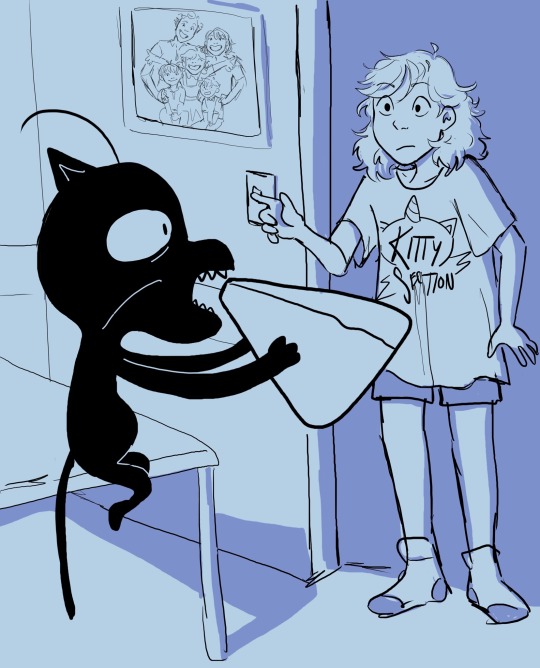
emma dupain cheng on the brain😽🎀
more:
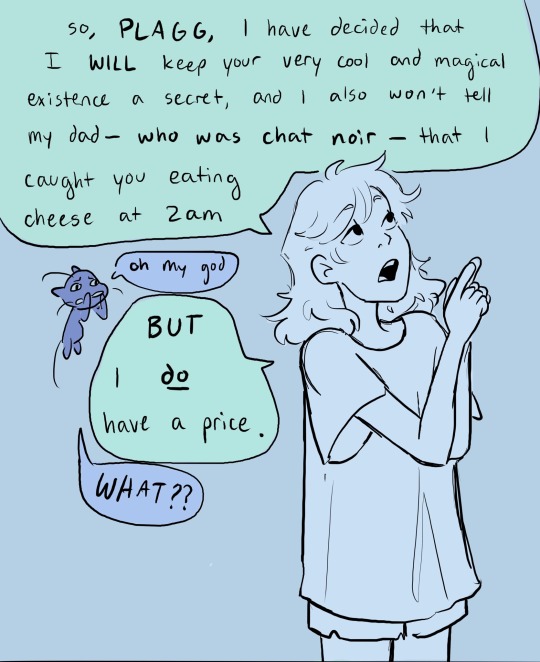
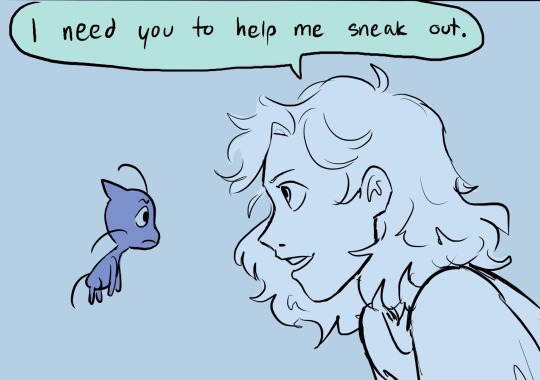
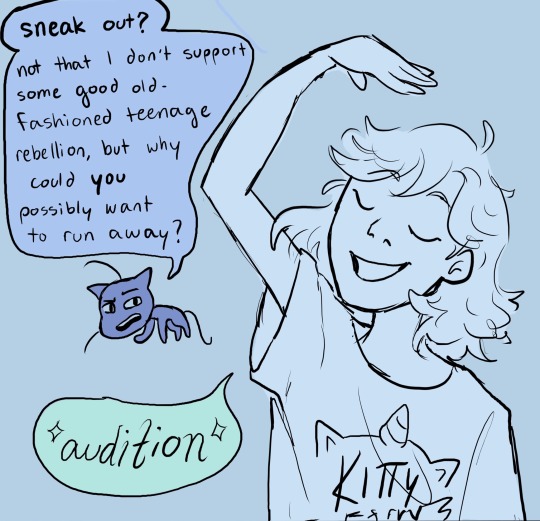
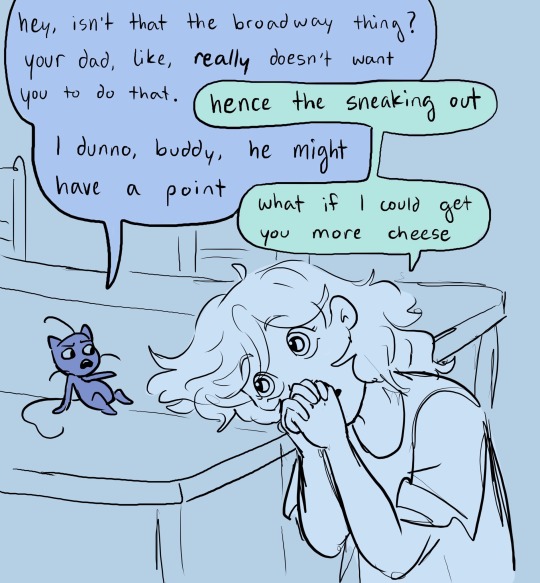
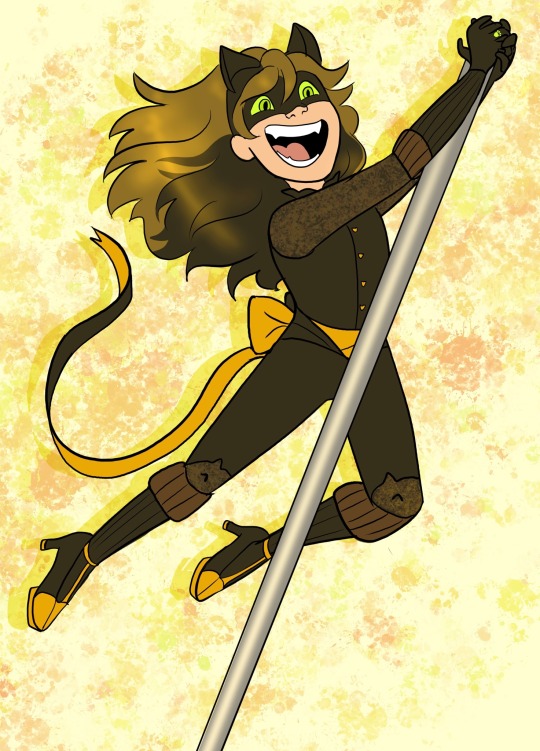
#ml#miraculous#miraculous ladybug#my art#emma dupain cheng#emma agreste#(i think that may the more popular tag for her lol. she is a dupain cheng in my heart though)#plagg#she is thirteen almost fourteen here btw. because i love circularity#emma dupain cheng to me is like. what if emilie or adrien grew up in a stable home with no trauma. that’s emma#and she is theater kid✨#and adrien and marinette are soooo so so supportive and love going to her shows and are so proud of her#/marinette has to be held back from trying to manipulate the school play casting process to secure emma the lead every year#but then emma sets her sights on bigger things(broadway west end)#and adrien pumps the breaks big time#and he’s so torn between supporting her interests and wanting so badly to keep her from like. being a child actor. having a job. b#being pulled from school#and emma gets upset bc he is standing in the way of her dreams#and they fight about it:(#and then emma discovers plagg and convinces him to help her sneak out and go to her callback that she secretly auditioned for#(and forged all the parent signatures for lol)#and. well. plagg CAN be bribed#and also she just reminds him so much of baby adrien🤧 he is a softie#and she runs away to her callback. and adrien and marinette wake up the next morning and see on the news that there is a new chat noir.#anyway. not that i’ve thought about it or anything
5K notes
·
View notes
Text

wing stuff!
experimenting with a more cartoon style, idk what i'm doing loll
tagging: @goodomensafterdark <3
#ymight say i'm *winging* it!!#then again you might not#my art#good omens#fanart#crowley#aziraphale#wings#digital art#digital painting#aziracrow#ineffable husbands#wasn't completely without references here esp for the wings#but i got further away than usual#and didn't use screenshots of michael sheen or david tennant's faces to do the characters' faces#i'm all right with how everything turned out except crowley's face#i have a hard time simplifying and leaving things out for drawing small or more cartoony#i end up trying to clumsily cram more detail in than the size or style wants and it looks weird#oh well it is practice it is valuable!!#i did most of this yesterday which was my bday lol present to myself#my days of short captions and a journal in the tags have come to a middle
2K notes
·
View notes
Text
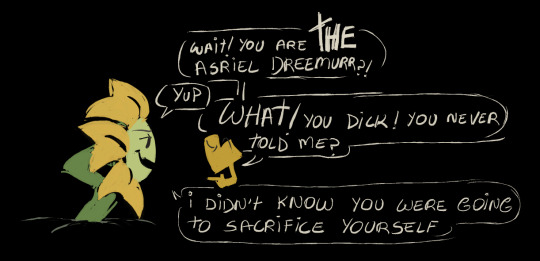
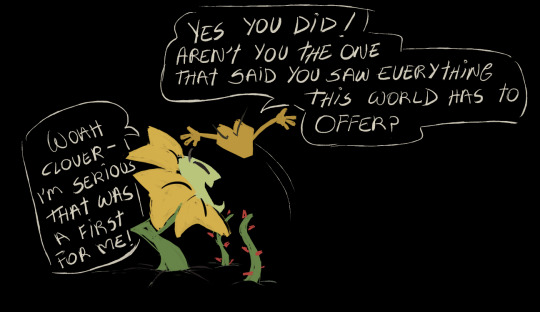
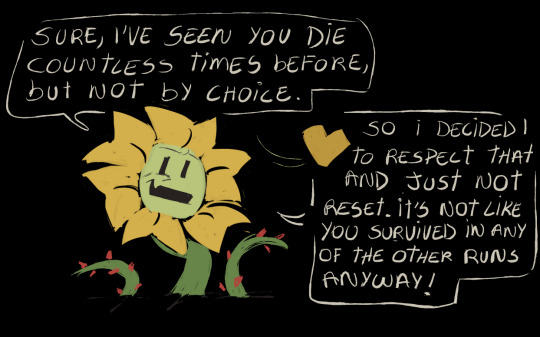
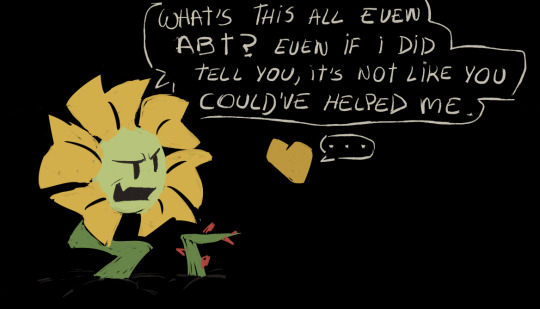

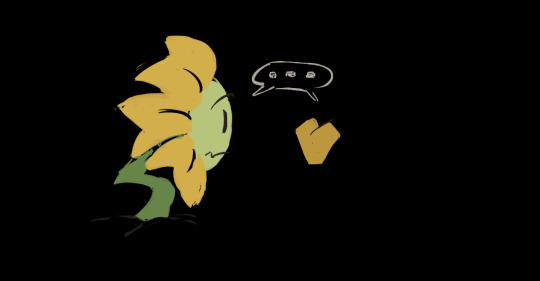
#my art#undertale#undertale yellow#undertale fanart#idk what is the point of this comic#ig i just wanted to see them interacting#i was going to end on some deep shit like#“well ig despite it all we were somewhat friends” but did not knew what the conclusion to that would be so i just ended with a funny#the context for this is after the asriel dreemurr fight#where they find out abt the whole lore of flowey#and clover is just super perplexed that they were interacting with a royal LOl
5K notes
·
View notes
Text














Peepaw Starlo struggles. Autism 2 autism communication struggles.
#undertale yellow#uty#uty au#lucky clover au#frisk ut#starlo uty#ceroba uty#martlet uty#dalv uty#feisty four uty#the cowboy hat draws#FALLS OVER. THIS TOOK OVER A MONTH.#Mostly because of being busy IRL but also because I decided on a new rendering method#Aaaand it was ten times as time consuming and I don't like the end result at all. LMAO. You live and learn I suppose#I hope this is comprehensible um. I think a lot about Starlo being so used to understanding Clover easily and being one of their favorites#And going to Frisk and 1. not really understanding how they communicate and 2. feeling like he isn't their favorite LOL#Idk how well that reads but! Peepaw Starlo musings#Starlo tries his best and doesn't always get it right but he's in a better place now#I know Clover's absence feels very strange here but I just couldn't find a place to put them oops.#Drawing this made me realize I really gotta practice my backgrounds. Hough. Definitely in the new year!#Also I haven't played poker in years so anything that's wrong? Uh monster poker is different. Yup. Thumbs up emoji
430 notes
·
View notes
Text

summer heat ☀️☀️☀️
#haikyuu#hq#yamaguchi tadashi#tsukishima kei#tsukkiyama#took a socmed break for a few months and ended up watching haikyuu#didnt think id like it because im not really a sports anime guy but now im embarrassingly invested lol#it's dredging up all sorts of nostalgia for my time on the middle/high school team....#hq replicates the feeling of being a crappy underdog team at a big tournament really well haha#my art
818 notes
·
View notes
Text
Prompt 185
No one could get into contact with Constantine.
Now usually that wasn’t that big of a deal, the man constantly disappeared for a few days at a time doing something or other, but he’d been completely silent and unseen for months. Usually he’ll at least answer a call to tell them to fuck off or something.
And they really need his expertise and are getting incredibly worried for their grumpy team member. Yes he’s an asshole, but he’s their asshole, y’know? And he has a habit of getting into Situations (sure he also usually gets out of them, but what if he didn’t this time?!)
So they’re desperate. Kind of really desperate. Desperate enough to use the summoning sigil they found on his fridge. They’d checked it, multiple times, and it should summon the hellblazer.
“You’re not Constantine.” .
The white-haired teen in the circle yawned, stretching and blinking at them blandly with familiar blue eyes before sighing. “Actually I am,” he stuffed his hands into his hoodie as he looked down at the summoning circle. “Well, technically just one of the many Laughing Magicians currently in the Realms.”
He gave a grin, looking more amused than annoyed. “Pretty much every one of us is in the Realms right now for family reunion lol. (Did he just say lol out loud??) So like, you’re gonna have to specify which of us you’re tryin’ to summon. Honestly perfect timing for me thanks, the fruitloop keeps flirting with John and it’s horrific so.”
… That was probably their John, wasn’t it…
#dcxdp#dpxdc#prompts#The Constantine Family exists for fucking over entities & manipulating luck#They adore this scrappy halfa who is doing the same with twice the feral#Danny: Yeah I’m like the changeling child that ended up in the middle of them and they just kept me for the laughs lol#Danny: I’m not allowed to join in the drinking competitions#Danny: Oh no it’s not a responsibility thing; alcohol doesn’t affect me and they say it’s cheating#Why Yes Vlad IS flirting with their Constantine#He’s started his redemption but let’s be honest he’s also a con-man & John is all for fucking over the rich#Danny is disgusted at how well they’re getting along and wanted to get away from their flirting while everyone else ribbed at em#Hence why when they all felt the summoning he decided to go#Well that and also for the laughs because he’s learning magic Undead Constantine style#”Fuckin 'ell yeah the family 'as a necromancer in 'he line again look a' 'im go!” (Lots of ghost & living people drunken cheering)#Danny only half fucking with people: Yeah I’m like their collective undead fae child lmao#danny fenton#john constantine
2K notes
·
View notes
Text
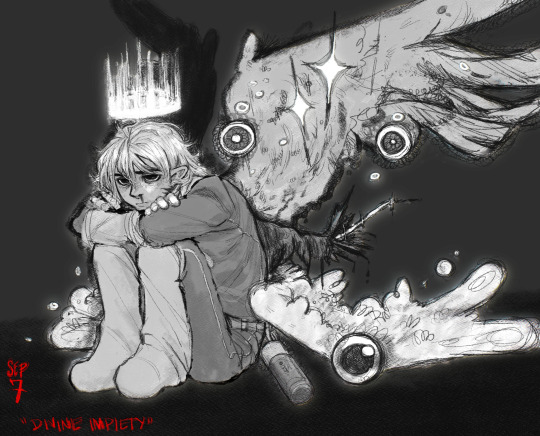
I can’t think of anything as impious as killing yourself whenever you feel like it lol
@surelysilly
#ok. so. I did this wrong.#I panicked bc I only got a little bit of time before the end of the day so I just ran with my first thought#but it ended up just bearly beifn considered a dpxspn on a technicality lol#ok so I didn’t see the slash between divine and impiety so I assumed that was the whole prompt#oh well.#so like. I guess the wings represent uhhh when he died the first time- when he intentionally killed himslef the second time- and finally#an amalgamation of all the times he kills himslef when he transforms#somethign abt the flippant disregard of his life seems umrn…not exactly holy lmao#danny phantom#skeh#9/7/24#superphantom#superphantomweek2024#dp x spn
669 notes
·
View notes
Text
the leverage team would have had a games night… once. everyone cheated so much and in such increasingly extreme ways that all mentions of monopoly are banned in their headquarters (this makes talking about marks who monopolize the market very confusing)
#leverage#nate wouldn’t cheat but he’d be by far the most annoying still. like he’d conduct a whole Scheme to win and give a little monologue wheneve#he made a good move and everyone would want to kill him#parker woukd obvs be stealing money & cards and she’d move their pieces and swap their stuff#but also she’d try to use her turn to rob the bank#sophie would use neurolinguistic programming and dominate the board w properties#which somehow parker would literally never land on and that’s incredibly suspicious but none of them really know how she could possibly be#manipulating that fact? it’s logically impossible bc they’re watching her roll the die and move the piece and sophie knows which properties#she owns so it makes no sense. but parker is parker and she simply will not be caught (even by sophie’s properties)#hardison has studied monopoly theory (yes there are math theories on how to play monopoly) and /tries/ to abide by them but again. sophie i#manipulating him and parker is stealing from him (and sometimes oddly enough *for* him. new money ends up in his bank somehow) so it’s hard#so eventually he resorts to cheating like Everyone Fucking Else and does pretty well bc he rlly does know what sets he wants etc.#eliot is genuinely playing normally. no cheating no math stuff no schemes.#but he’s just sitting there fuming the entire time bc they’re all very obviously messing with the game and he Knew this was gonna happen bu#goddamn hardison & parker especially know how to get on his nerves (often purposely)#he calms down by making some snacks and. resorting to also cheating lol.#leverageposting
520 notes
·
View notes
Text


♡ ♡ ♡
#wanted to post this before my 21st ended lol#taylor swift#all too well#red#tsedit#tswiftedit#tswiftgif#*mine: gifs
402 notes
·
View notes
Text



SPIRIT OF THE WEST: The Major Motion Picture
It's a summer evening in the late 90s and you and your friends are looking for something to watch at the slumber party. You go into your local Video & Variety and happen upon the coming of age romance, Spirit of the West. Let's hope this doesn't awaken anything in you....
SUMMARY:
Dean grew up on a horse farm and can't imagine any other life. There are drawbacks to working for his father, but they're worth it if it means remaining with his beloved horses. Besides, between his broken arm and his lack of prospects, he hasn't got much else.
Something of an outsider, Dean always feels like there's something he's missing. But this tense summer brings back a figure from his past: years ago, a teenaged Cas worked for a season at the Winchester ranch. His return could change everything.
Reviewers rave: "If you ever wanted a 90s horse girl book, but starring a young Dean Winchester, this is your flick."
Spirit of the West is written and directed by Teen_Dean / @urne-buriall
▶️ PLAY Spirit of the West ⏪ REWIND with Spirit of the West Prequel by @foolondahill17 ⏩ WATCH IT AGAIN with SOTW Daily 🌟 BONUS FEATURES ✨ Director's Commentary 🎶 The Official Motion Picture Soundtrack
#using the tags as my footnotes for a sec#this something i wanted to do *last year* but well. i didn't get around to it til now#spirit of the west means so much to me and in my mind it is a movie that we all can watch together on some summer night#the cover image was an insane process that started with a still from that horribly over-exposed video of young jensen riding a horse#i tried to do some photoshop editing on it. then ended up digitally painting over it#young cas was so tricky. so much of young misha does not look like cas to me#also don't look too closely at the manip 'stills' lol#and fun fact: the silhouetted image of the horse and rider on the spine is actually jensen from that video of him#anyways this was so fun to make<3#myedits#spirit of the west#sotw
562 notes
·
View notes
Text

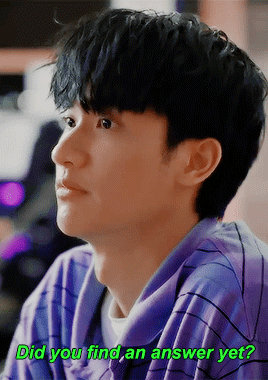

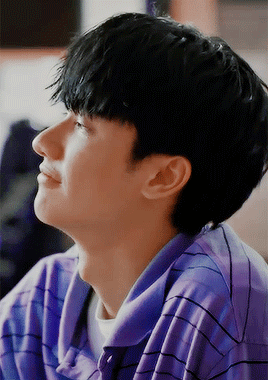
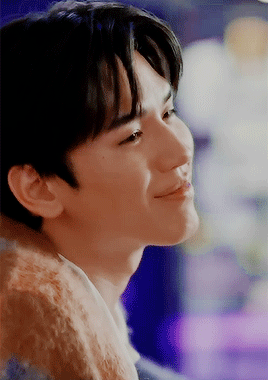

"do you agree? - yes."
#peaceful property#peaceful property series#taynew#peaceful property ep12#peachhome#peach x home#tay tawan#new thitipoom#gmmtv#thai drama#i didnt have time to make content about this show sadly but as this is the finale i wanna take a few seconds to say#that this was an absolutely incredible production and I am in absolute awe of it#so so well done in every aspect and the found family trope hit harder than ever#somehow ended up tearing up in every episode lmao#taynew delivered another masterpiece and i will never ever doubt them again lol#peach is adorable as heck and newie is an ACTOR alright like damn#and all the cameos? on fcking POINT#to air such a gem on a random wednesday? a crime.#which on the other hand gives me higher hopes for THK lmao#but anyway i loved every second of this and i highly recommend it to anyone who hasnt seen it#more like this in the future please thank you!!!!!#gmm does get it right sometimes#but only if its bromance and said bromance is clearly not in the room with us#which is a very unique type of genre#but somehow it hits the spot#end of review
275 notes
·
View notes
Text
wei wuxian vs. pragmatism: what MDZS intends to say about righteousness
copy/pasting most of my rather bitchy reply into its own individual post because i think it deserves to stand on its own.
so i think we can all agree that MXTX intends for us to read MDZS and conclude that wei wuxian is ultimately a deeply heroic and righteous person. whether you as the reader agree with this assessment of wei wuxian's moral character is another question entirely, but at the very least it is fairly obvious to all of us that MXTX intends for us to read him as a good person.
so why does MXTX call wei wuxian a good person? what aspects of his character and which of his choices make him a good person? what moral framework and what definition of morality does MXTX employ in order to call wei wuxian a good person?
i posit that MXTX argues that wei wuxian is heroic precisely because he is not pragmatic - because he adheres to his moral ideals despite the consequences, and because he did not make moral sacrifices at critical junctures of his life. the first half of this post will argue that wei wuxian is not pragmatic. the second half of this post will argue that this is exactly why wei wuxian is heroic, and that the moral framework employed by MXTX is deeply idealistic instead.
so let's begin.
let's start by establishing two things.
first: what MXTX argues about morality through the narrative of MDZS and the reader's own beliefs about morality are two different things. me saying "MDZS argues that xyz is righteousness" and me saying "i think xyz is righteousness" are two different statements. the following analysis is concerned not with what i myself consider to be righteous, but rather what MXTX argues through MDZS is righteous.
second: wei wuxian is not pragmatic.
what does it mean to be pragmatic? unless we are speaking about the school of philosophy specifically (which i am not here), being pragmatic means being grounded in reality and focused on practical outcomes. it means being result-oriented and considering the consequences of your actions before you act; it means acting only after you have considered the potential consequences of all possible courses of action and have then decided which outcomes are acceptable. being pragmatic also means recognizing when achieving everything you want is impossible. and, in such situations, being pragmatic thus entails compromising to achieve a desired outcome, even if that means you don’t get everything they want. to put it in edgier terms, being pragmatic means being able to make moral sacrifices.
an idealistic person attempts the impossible. a pragmatic person recognizes when something truly is impossible.
wei wuxian is not pragmatic.
first, wei wuxian is not someone who carefully considers the consequences of his actions before he acts. in fact, he displays a startling lack of consideration for consequences. it repeatedly falls upon other characters to either try (and fail) to hold him back.
when wei wuxian punched jin zixuan for insulting first jiang yanli and then jiang cheng, did he consider that jiang fengmian and jin guangshan might then dissolve the betrothal, and that jiang yanli might have wanted to make a decision regarding that on her own? no. he just punched jin zixuan because he was mad that jin zixuan had insulted two people he loved.
when wen chao threatened mianmian, and lan wangji and jin zixuan stood up for mianmian, and then wei wuxian stood up for them by holding wen chao hostage in turn - did he consider that there might be consequences for humiliating and threatening the life of the son of a warmongering great sect leader who has already proven capable of attacking other sects? no. did he stop and think "alright, wen ruohan has already attacked the cloud recesses, which proves that he's willing to wage war against the other sects. threatening the son of a sect leader is an easy way to earn any sect leader's ire, and since i'm the first disciple of the jiang sect, this puts not just me but the entire jiang sect on wen ruohan's shitlist"? no. it would be one thing if wei wuxian weighed this possibility and then decided that rescuing an innocent girl and the people who defended her was more important was worth the risk - that would show that he considered the consequences and then made his choice. but the thought simply never entered his mind. he acted simply because he wanted to save mianmian, jin zixuan, and lan wangji from the wens; he did not think beyond that.
when wei wuxian busted the wen remnants out of the qiongqi pass labor camp, did he have a clear plan as to how he was going to weather the political fallout? did he have a plan more detailed than "live quietly in the burial mounds until everyone forgets about us"? no. when jiang cheng challenged him as to how he was going to survive the situation, he did not in fact offer anything more concrete than "we'll just wait for everyone else to forget about us." he blustered about being a once-in-a-generation genius who could accomplish the impossible, but he provided no actual plan as to how he was going to do it. this leads me to conclude that wei wuxian did not in fact have a long-term plan for handling the consequences when he went ham at the qiongqi pass camp - that, instead of weighing the consequences and then making his decision, he instead decided immediately that this was something he had to do, consequences be damned.
and then - on top of this - all of his following actions then point in the exact opposite direction of his stated plan of waiting for everyone to forget about them. because instead of doing anything to fade into the background, everything wei wuxian did instead just convinced the jianghu he was an intolerable threat.
and this was not a sustainable strategy.
one thing i really appreciate about MXTX is that she does not make the rest of the jianghu into one-dimensional villainous morons. it's quite easy for lazy writers who want a persecution plotline to have the rest of the story's society magically start hating on the protagonist for no good reason, to make every background character in the story's world a three-braincell moron. but MXTX is not that author. it speaks to MXTX's skill as an author that, from the perspective of the rest of the jianghu, fearing wei wuxian as a mortal threat was an entirely reasonable conclusion for them to come to.
first, the gentry's most recent direct interaction with wei wuxian during this time period is him threatening to kill all of them. when jin zixun doesn't give him the information he wants, wei wuxian straight up says: "if i want to kill everyone here, who can stop me? who dares stop me?" this is a threat! and - surprise - threatening to kill people naturally makes people think that you want to kill them!
next, wei wuxian refined wen ning's dead body into the first sentient fierce corpse in history, and also the strongest fierce corpse in living memory - and then took wen ning with him on night-hunts. that's where the reputation of "the yiling patriarch and his ghost general" comes from. this very naturally made the rest of society fear him even more, because now the guy who has just recently threatened to kill you has demonstrated even more of the power to easily do so! the unparalleled power to do so, which no one else possesses and it would be very hard for anyone else to counter! add in the fact that wei wuxian's activities were also attracting prospective disciples - people gathering outside the burial mounds because they wanted to learn demonic cultivation - and naturally the public is even more frightened, because now it looks like the guy who threatened to kill all of you is also gathering the political force to do so!
the public is incorrect about wei wuxian's intentions, of course. but what does wei wuxian do to correct these misconceptions? to rehabilitate his public image, because now his public image has the life of not just himself but also all the wen remnants under his protection riding on it? to prove to the public that he isn't an active threat to their lives - that he does not seek to murder them all in their beds - that it is safe for them to allow him to live, and that they can in fact survive if they don't kill him?
nothing.
it would be one thing if the story mentioned how wei wuxian tried to correct the malicious rumors about himself and failed. but that is not what happened. what happened is that wei wuxian sat on his corpse mountain and let everyone else say what they wanted to say. and when he left his corpse mountain, it was to bring his one-of-a-kind unparalleled sentient fierce corpse with him on night-hunts, which of course just fanned the flames of the rumors instead. he doesn't even tell the prospective pupils camped on his front door to fuck off - he just sneaks in through the back door.
this is not pragmatic behavior. though you can argue that wei wuxian's strategy here was to become so powerful and so scary that no one would dare try to fight him, anyone with a brain can tell you that this is not a sustainable solution in the long-term. first, if you want to use threats to keep someone from attacking you, you also need to promise stability - you need to give people the reassurance that if they don't start shit with you, then you'll leave them alone too. if you drive the "threat" factor too high, as wei wuxian did, you instead end up convincing people that if they do nothing you'll kill them anyways - that they have no choice but to kill you if they want to survive.
second, if you want to use threats to keep someone from attacking you, you also need to prepare for the inevitability that, if someone does end up getting hurt, everyone will blame you first and no one will want to hear your side of the story. after all, if someone gets hurt, then the first suspect everyone looks towards will be the guy who's been consistently saying "i'm strong enough to hurt you! i'm strong enough to hurt you! don't start shit with me because i'm strong enough to end you!" for the past few months. this is basic common sense. and yes, the society of MDZS is unfair - wei wuxian deserved a proper trial and investigation after the death of jin zixuan. but the fact that society is unfair is something a pragmatic person would have recognized and planned for.
wei wuxian did not recognize and plan for this reality. even after he accidentally kills jin zixuan, wei wuxian still insists that if only the jianghu investigates jin zixun's hundred holes curse, they'll see that wei wuxian didn't cast the hundred holes curse, they'll see that there was more scheming going on, etc etc. wen qing has to directly spell out for him that, at this point, society no longer cares about the truth of the matter. it seems that wei wuxian was actually oddly idealistic about the true nature of his society all the way until the very end.
all of this leads me to conclude that, when wei wuxian busted the wen remnants out of the qiongqi pass labor camp, he did so without considering the consequences of his actions. he assumed that he could improvise and weasel his way out of this situation, as he's always done in the past with his typical genius - only this time, he was wrong.
wei wuxian acts without considering the consequences of his actions. he does not make a decision only after carefully deliberating over all of the potential outcomes - not at all. instead, he acts in the moment - not out of any rational consideration of potential outcomes, but rather because it is simply something he must do. this by definition makes him a deeply unpragmatic person.
to put it into more familiar terms, for wei wuxian, the righteousness of an action comes not from its consequences, but are rather inherent to the action itself. even if he were doomed to fail, he could not give up on the wen remnants.
second, at critical junctures, wei wuxian is unable to make moral sacrifices. to be pragmatic is to know when you have to sacrifice: to know when, in order to achieve the most inalienable of your goals, you have to give up on some of your other goals. this is something wei wuxian is consistently unable to do.
of course, when it comes to his own wellbeing, wei wuxian is all too willing to sacrifice. he'll carve out any number of his internal organs to save those he loves. but this honestly speaks less to wei wuxian's moral framework and more to his lack of self-worth from a troubled upbringing.
because, when it comes to any moral cause, wei wuxian is entirely unable to sacrifice anything, even if being unable to sacrifice entails more negative consequences. wei wuxian could not sacrifice mianmian, jin zixuan, and lan wangji to wen chao and his goons, so he took action and took wen chao hostage himself. to sit back and do nothing as wen chao threatened the lives of those three was simply unthinkable for him - even if it meant taking a course of action that put yunmeng jiang in danger.
wei wuxian's relationship with jiang cheng deteriorated because jiang cheng did not know about the golden core transfer: because jiang cheng did not know that wei wuxian could no longer cultivate, from jiang cheng's point of view, it looked like wei wuxian was just refusing to help out and fulfill his promises for kicks. wei wuxian could have made things a lot easier for himself and also any wen remnants he chose to rescue had he simply told jiang cheng the truth - but he knew that finding out the truth of the golden core transfer would make jiang cheng miserable, and [jiang cheng's happiness] was not something he was willing to sacrifice.
wei wuxian's single most prominent moral decision is his refusal to allow the wen remnants to be sacrificed. anyone with a shred of political sense had to know that rescuing the wen remnants and then protecting them would be near impossible - that it entails making an enemy of the jin, and due to the jins' power, the entire jianghu. wei wuxian himself knew this; he is no moron. wei wuxian also had no long-term plan, no allies, and significantly less power than the rest of the world believed. yet, despite this all, he acted anyways, because he could not let the wen remnants be sacrificed.
the wen remnants wei wuxian rescued from the qiongqi pass labor camp included both regular civilians and cultivators. perhaps wei wuxian could have negotiated a proper release for the non-cultivating civilians, such as granny wen and a-yuan, had he chosen to give up on the cultivators. but - the question of whether this would have worked or not aside - this was not a sacrifice wei wuxian would be willing to make.
nor could wei wuxian sacrifice the safety of yunmeng jiang. i am firmly of the belief that, had yunmeng jiang formally stood by wei wuxian's side after wei wuxian attacked the jin-run labor camp, lanling jin would have eventually declared war on yunmeng jiang, and yunmeng jiang's would inevitably be destroyed. both wei wuxian and jiang cheng understood this as well - which is why wei wuxian told jiang cheng to let him go.
(you can argue - successfully - that wei wuxian did in fact sacrifice [his obligations to yunmeng jiang and his promise to jiang cheng] by leaving yunmeng jiang to protect the wen remnants. this is true. but i think that - from wei wuxian's point of view - this was not much of a sacrifice, because due to wei wuxian lacking a golden core, he already viewed himself as mostly useless to yunmeng jiang. so him leaving - in his view - is not really that much of a loss for yunmeng jiang.)
wei wuxian promised wen qing that he would return wen ning's consciousness to his corpse. when wei wuxian made this promise, he had no idea if he could actually pull it off or not. but then he did - and, in the process, created the most dangerous weapon the jianghu had seen in living memory. wen ning specifically, or moreso wei wuxian's inability to control him, leads to so much of wei wuxian's eventual downfall: wei wuxian loses control of wen ning and accidentally kills jin zixuan; when wen ning goes to turn himself in at jinlintai, he ends up going berserk again and killing another 10-20 jin and lan cultivators, which leads to the nightless city pledge conference. frankly, wei wuxian could have avoided a lot of trouble - or at the very least, a lot of the public's fear - had he not raised wen ning from the dead. it's not like he'd be completely defenseless without wen ning, either. but wei wuxian promised wen qing he would resurrect wen ning - and he could not sacrifice his promise to wen qing because of what wen qing had already done for him.
a pragmatic person is able to make sacrifices, including moral ones. at the very least, a pragmatic person recognizes when sacrifice is inevitable, when all paths lead to something being lost. a pragmatic person, put in the trolley problem, would recognize that there were only two options and that both options involve sacrifice: either he must kill one person, or he must allow five people to die. there is no path forwards in which all six people live.
wei wuxian is unable to make moral sacrifices. he clings on to all of these moral causes, all of these promises and obligations, and it is precisely because he attempts to hold onto all of them that he ends up losing everything. to reuse the previous example, wei wuxian in the trolley problem tried to save all six people because he could not accept any of the sacrifices made inevitable by the trolley problem.
to put this all together - wei wuxian is not a pragmatic person. he makes decisions with his gut, not his head - he does not consider the consequences of his actions before he acts. nor is wei wuxian able to make sacrifices - even necessary ones in order to avoid greater tragedies.
but. none of this means that wei wuxian is not a deeply heroic person. rather, to do what you believe to be righteous and attempt to live up to your ideals despite the consequences is exactly what MXTX lauds as moral. and to be unable to make a moral sacrifice when everyone else in your society easily does so is in fact deeply heroic.
it is precisely because wei wuxian is not pragmatic that MXTX declares him a hero.
some people, including myself, favor a moral framework that centers pragmatism and reason as virtues. to us, the ideal moral character is someone who makes decisions based on reason and not emotion, who considers the potential consequences of every course of action before making a decision, and who then, based on these inferred future consequences, uses reason to deduce which of all of the possible outcomes is the most preferable.
but this does not in fact describe wei wuxian, nor is this how wei wuxian views ethics. and to be honest, i don't think this is how MXTX views ethics either.
in all three of her stories, MXTX repeatedly comes down harder on the characters who make pragmatic decisions, the characters who are willing to sacrifice. in fact, killing sunshot soldiers while acting as wen ruohan's spy, and then killing nie mingjue's men in order to ensure a chance at killing wen ruohan and saving nie mingjue, was the pragmatic thing for meng yao to do, because that was the least bloody path forwards towards a sunshot victory over qishan wen. in fact, cutting ties with wei wuxian after he attacked the jin-run qiongqi pass labor camp was the pragmatic thing for jiang cheng to do, because it was the only path forward that did not put yunmeng jiang, his first and foremost responsibility, in the line of fire. and yet (though the situation is less clear with jin guangyao), MDZS as a narrative criticizes both jin guangyao and jiang cheng for these decisions - because, to MDZS, righteousness does not lie in pragmatism.
(this is a statement i personally disagree with. but we are here to discuss what MDZS wants to say about pragmatism and righteousness, not what i want to say about pragmatism and righteousness.)
by contrast, the one single act for which deeply controversial jiang cheng is ultimately lauded for in the narrative is also his single least pragmatic, most emotional act. the one single act of jiang cheng's that MDZS does not criticize is when, after the fall of lotus pier, jiang cheng ran out from his hiding spot to distract the wen soldiers from seeing wei wuxian. from a filial, duty-based point of view, this was a deeply stupid and unpragmatic course of action: jiang cheng's first and foremost duty, as the sole surviving jiang and new sect leader jiang, was to survive, rebuild his sect, and avenge his parents. from a consequentialist point of view, this impulsive choice is also what led to the domino-fall of tragedy that followed, since jiang cheng then got captured and had his golden core melted, which then led to everything else. yet this stupid, unpragmatic, and impulsive decision is ultimately the one act MDZS considers to be jiang cheng's single most heroic.
the key as to what MDZS considers to be heroic, what it considers to be righteous, lies in the jiang family motto: 明知不可而为之, attempt the impossible. this line, taken from the analects of confucius, can be considered to be a deeply deontological ideal. i find this twitter thread (warning to my followers: does kind of dunk on JC) to be rather helpful in elucidating this line's meaning.
to attempt the impossible, to try what shouldn't be tried. "ask yourself not whether you can do it, but whether you should...consider not the result but rather the journey - have a clear conscience regardless of outcome." in other words, what matters is less whether you succeeded or failed, or what sort of outcome your actions brought about - what matters is that you tried. what matters is that, in the face of overwhelming odds, you tried to do what you think is right. and even if you end up failing - even if everyone you sought to protect ended up dying - the fact that you tried still has moral weight.
this is why it was righteous of wei wuxian to save the wen remnants - even though the ultimate consequences of that decision were overall negative, even though everyone wei wuxian tried to protect died. in fact, if wei wuxian had died immediately - if he had been shot down by jin archers at the qiongqi pass labor camp the moment he came within their range - if he had died before any wen in the labor camp realized someone wanted to save him - he would still be a righteous person. because, for MDZS, what makes an action righteous is not its consequences. for MDZS, what makes a person righteous is not what impact their actions have on the world, but rather that they have the sort of moral character that leads them to never give up on their ideals.
wei wuxian does not consider the consequences of his actions before he acts. or, should i say - wei wuxian makes decisions despite their consequences, because despite the consequences there are simply some moral causes he simply cannot give up on. wei wuxian did not save the wen remnants because it was pragmatic to do so. it was in fact deeply unpragmatic to do so. no - wei wuxian saved the wen remnants without a concrete long-term plan, without having thought through anything beforehand, with the knowledge of how weak he was in reality - because he could not give up on the wen remnants, consequences be damned.
to have some moral causes you simply cannot give up on, no matter the consequences - to MXTX, is deeply heroic. in this sense, MXTX's moral philosophy is not pragmatic at all, because to be pragmatic is to be concerned with practical consequences. instead, both wei wuxian and MXTX herself are deeply idealistic, because what matters to them are ideals and principles that extend beyond consequence.
as the linked twitter thread notes, this is why MXTX waits until the very end of the book to reveal that wen yuan, now lan sizhui, lived. this is why wangxian only meet mianmian and her family at the end of the book. this is why all of the cumulative positive impacts of wei wuxian's resurrection - jin ling forgiving wei wuxian, jin guangyao, and wen ning, for one - are kept to the end of the story: because MDZS needs to move away from the consequentialist argument. MDZS needs to establish that wei wuxian's righteousness is separate from the impact of his actions: that wei wuxian isn't righteous merely because his actions had a positive impact for which others can thank him, but rather because the actions he undertook were inherently righteous on their own. that even if none of these positive impacts existed - if wen yuan had also died, if mianmian hadn't made it - then wei wuxian's choices would still be moral.
this is also why MDZS ultimately comes down harder on characters like jiang cheng and jin guangyao, even though a more results-oriented moral framework would instead laud such characters. both jiang cheng and jin guangyao are deeply pragmatic characters: they put concrete results before abstract moral ideals, and they're willing to compromise on their ideals in order to achieve better results. i am a JC stan and a jiggy apologist because of these exact traits. but MDZS is a narrative that criticizes such pragmatism and instead holds up wei wuxian's idealism as a moral ideal - so, in order to advance its themes, the MDZS narrative ends up criticizing both jiang cheng and jin guangyao.
ultimately, this idealism - this criticism of pragmatism - lies at the heart of MDZS's themes. wei wuxian's righteousness is directly connected to the fact that he is not pragmatic. the fact that wei wuxian makes moral decisions despite the consequences, and that he is unable to sacrifice any moral cause - is all part of what makes him at once deeply unpragmatic and deeply heroic.
---
you see, the funny thing here is that i personally disagree with this theme. as i've said before, i'm a utilitarian. to me, the morality of an action does in fact arise from its consequences; to me, someone who compromises on their ideals to achieve better results is preferable to someone who adheres to all of their ideals and then loses everything. the character i consider to have had the greatest positive impact on this story's world is jin guangyao. the character i consider to have most dutifully fulfilled his obligations is jiang cheng.
therefore, i disagree with basically everything i wrote up there about "trying": i think that if you try to do the right thing, fail epically, and in the process of your failure get a bunch of other people killed as well, the fact that you failed this badly does in fact matter quite a bit. the bulk of my more haterish posts are born from this fundamental disagreement with what MDZS posits is righteousness.
however. as a reader i must recognize that [what i consider to be moral] and [what the author of this story considers to be moral] are two different things. my own moral philosophy may be heavily results-oriented, but MXTX's is much less so. therefore, regardless of what i think of wei wuxian, i conclude that MXTX ultimately intends for us to read wei wuxian as a heroic figure for the exact reasons i gave above - and that fact must then inform every analysis of MDZS i write.
#mdzs#wei wuxian#yanyan speaks#this analysis is also focused on wwx's first life bc wwx in his second life seems to give much fewer shits about moral causes tbh#second life for wei wuxian + all the good rewards at the end is basically a victory lap lol#anyways rip jiang cheng and jin guangyao for being pragmatists in a work that celebrates idealism#get dunked on ig#anyways wwx antis will read the above and go “well isn't this just a lot of words for 'the road to hell is paved with good intentions' ”#and like. yeah. that's correct#but mxtx is placing the majority of the moral weight on those good intentions imo#to mxtx - it is better to have heroic intentions and fail epically than it is to have unheroic intentions and achieve decent results.
245 notes
·
View notes